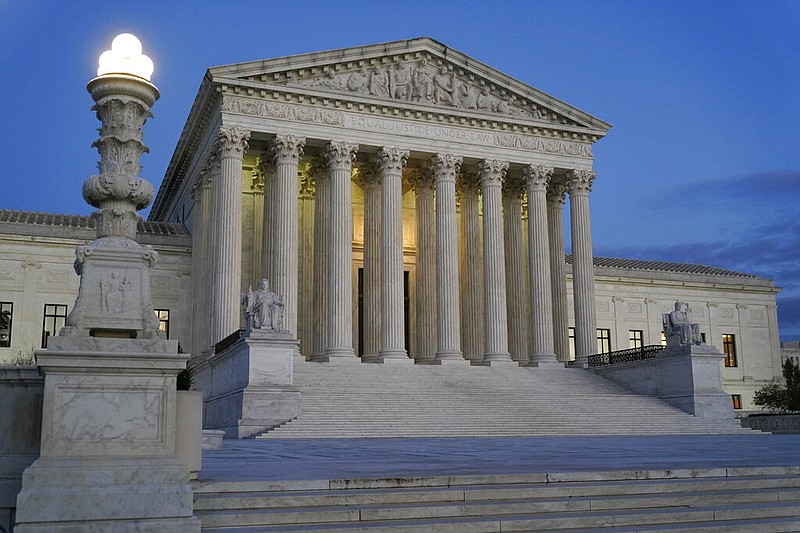WASHINGTON -- The U.S. Supreme Court on Tuesday denied a request to hear a case involving an Arkansas publication and a state law requiring contractors to pledge not to boycott Israel.
The Arkansas Times, through representation by the American Civil Liberties Union, sought an opportunity to appear before the nation's highest court after a lower court ruling on an Arkansas law in which judges determined the statute does not infringe on the right of free speech as stated in the U.S. Constitution.
Arkansas lawmakers passed a law in 2017 preventing state entities from entering agreements worth $1,000 or more with contractors willing to boycott Israel. The next year, the University of Arkansas Pulaski Technical College refused to enter a contract with the Arkansas Times -- a news publication in Little Rock -- after the news organization declined to sign the pledge. The institution and the publication had entered agreements in the past.
The Arkansas Times was not involved in any boycotts of Israel, but the organization refused to sign the pledge given its principles coupled with the additional factor of the advertiser being a public entity. The ACLU and its state chapter filed a lawsuit on behalf of the organization, contending the state law is unconstitutional because it penalizes boycotts involving certain political decisions while hindering public debate.
"Permitting state governments to withhold state contracts from citizens who voice opinions contrary to those held by a majority of their state legislators is abhorrent and a violation of the Bill of Rights," Arkansas Times publisher Alan Leveritt said Tuesday in a statement posted on the organization's website after the Supreme Court's decision.
The federal District Court for Arkansas' Eastern District dismissed the case in January 2019. A three-judge panel with the 8th U.S. Circuit Court of Appeals in St. Louis ruled two years later that the law violated the First Amendment, yet the full circuit court upheld the law upon rehearing the case.
"It does not ban Arkansas Times from publicly criticizing Israel, or even protesting the statute itself. It only prohibits economic decisions that discriminate against Israel," the appellate court said in its ruling. "Because those commercial decisions are invisible to observers unless explained, they are not inherently expressive and do not implicate the First Amendment."
The ACLU filed a request to the U.S. Supreme Court in October requesting justices to hear arguments on the matter.
"The Court's decision not to review this decision to protect our First Amendment rights is another instance of our rights being in jeopardy at all levels of government," Holly Dickson, ACLU of Arkansas' executive director, told the Arkansas Democrat-Gazette on Tuesday.
"All manner of rights that have long been relied on by Americans are now under siege. From free speech to voting rights to privacy and autonomy from overreaching politicians, Arkansans are at a crossroads between allowing these steady efforts to erode our freedoms, or instead speaking up for our rights and holding politicians accountable when they take actions aimed at any of us or our rights."
The Supreme Court's decision adds to the debate regarding similar laws. Lower federal courts have determined statutes targeting boycotts of Israel violate free speech protections.
"The Supreme Court missed an important opportunity to reaffirm that the First Amendment protects the right to boycott," Brian Hauss, a senior staff attorney with the ACLU Speech, Privacy, and Technology Project, said in a news release.
"From the Boston Tea Party to the Montgomery Bus Boycott to the boycott of apartheid South Africa, Americans have proudly exercised that right to make their voices heard. But if states can suppress boycotts of Israel, then they can suppress boycotts of the National Rifle Association or Planned Parenthood. While we are disappointed with the result in this case, the ACLU will continue to defend the right to boycott in courts and legislatures throughout the country."
Arkansas Attorney General Tim Griffin continued the state's involvement in the lawsuit after taking office in January and applauded the Supreme Court's decision.
"As the Eighth Circuit correctly concluded, the First Amendment does not protect refusals to deal with someone simply because of their nationality," he said Tuesday in a statement. "As Arkansas's Attorney General, I will vigorously enforce Arkansas's law and ensure that taxpayers aren't required to pay for anti-Israel and anti-Israeli discrimination."
U.S. Tom Cotton, a Republican from Little Rock, described the Supreme Court's action on Twitter as a "great win for Arkansas and America in the fight against" the Boycott, Divestment and Sanctions movement, a campaign against Israeli businesses and institutions over the military occupation of lands for a possible Palestinian state. Cotton called the effort "anti-Semitic."
"Outstanding news," he added on the Supreme Court's decision.
According to Leveritt, the Arkansas Times has made changes to its business model to ensure the publication is less reliant on advertisers.
"Our newsroom is now 100% funded by readers and donors. Thanks to support from our readers, we will not be signing any pledges dictated by our legislature," he said. "The Supreme Court can ignore our First Amendment rights but we will continue to vigorously exercise them."
